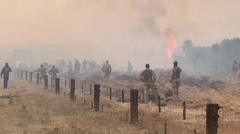The UK government has been compelled to confront the fallout of a significant data breach that led to the establishment of a covert Afghan relocation scheme. This initiative was initiated after a dataset containing the personal details of approximately 19,000 individuals who sought refuge in the UK after the Taliban's resurgence was mistakenly disclosed. The leak, attributed to an unnamed British defense official in February 2022, came to light again when parts of the information were spotted on Facebook in August 2023.
In response to the breach, a clandestine resettlement program was introduced, resulting in the arrival of 4,500 Afghans in the UK, with more scheduled to come. The scheme, formally instituted in April 2024, is reported to have cost £400 million so far, with projections suggesting it will total up to £850 million.
Defence Secretary John Healey disclosed in the House of Commons that a rigorous injunction was in place, which prevented any public discussion about the breach during its existence. He described the leak, resulting from a spreadsheet being mistakenly sent through unauthorized channels, as a "serious departmental error." Despite the gravity of the situation, the Metropolitan Police opted against an investigation.
The leaked dataset reportedly included sensitive personal information, raising concerns about the safety of those named, many of whom could potentially face retaliation from the Taliban. The original Afghan Relocations and Assistance Policy (Arap), aimed at facilitating expedited moving of individuals fearing retaliation, has faced widespread criticism for its execution, labeled as a "disaster" by a parliamentary inquiry.
A superinjunction that barred public knowledge of the data breach was annulled by a judge at the Royal Courts of Justice, who emphasized the implications for free speech and democratic accountability due to the lack of transparency surrounding the issue. As this developing story unfolds, further information will be released, emphasizing the need for robust safeguards to protect vulnerable individuals in crisis situations.
In response to the breach, a clandestine resettlement program was introduced, resulting in the arrival of 4,500 Afghans in the UK, with more scheduled to come. The scheme, formally instituted in April 2024, is reported to have cost £400 million so far, with projections suggesting it will total up to £850 million.
Defence Secretary John Healey disclosed in the House of Commons that a rigorous injunction was in place, which prevented any public discussion about the breach during its existence. He described the leak, resulting from a spreadsheet being mistakenly sent through unauthorized channels, as a "serious departmental error." Despite the gravity of the situation, the Metropolitan Police opted against an investigation.
The leaked dataset reportedly included sensitive personal information, raising concerns about the safety of those named, many of whom could potentially face retaliation from the Taliban. The original Afghan Relocations and Assistance Policy (Arap), aimed at facilitating expedited moving of individuals fearing retaliation, has faced widespread criticism for its execution, labeled as a "disaster" by a parliamentary inquiry.
A superinjunction that barred public knowledge of the data breach was annulled by a judge at the Royal Courts of Justice, who emphasized the implications for free speech and democratic accountability due to the lack of transparency surrounding the issue. As this developing story unfolds, further information will be released, emphasizing the need for robust safeguards to protect vulnerable individuals in crisis situations.





















